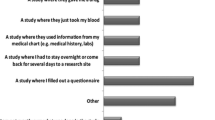Abstract
Despite some recruitment success in biomedical research among minorities, participation by African-American families into research, specifically genetic research, is lower than Caucasian families (Bowen and Penchaszadeh Community Genet 11:189–190, 2008). Such low participation rates by African-Americans prevent the exploration of specific ethnic differences in patterns of diseases and diminish the identification of specific disease risks among ethnic groups (Bowen and Penchaszadeh Community Genet 11:189–190, 2008). Although African-Americans are heterogeneous, few studies exist to describe effective recruitment strategies across diverse African-American populations, and even fewer studies share effective strategies for the enrollment of African-American families into genetic research. A process evaluation of recruitment strategies used by Project SuGar (a community-based genetic research study focusing on families affected by type 2 diabetes) to enroll African-American families into genetic research was conducted. Our goal was to enroll 400 affected African-American families, and our results yielded 672 families, (n = 672). Our success can be attributed to the formation of a Citizen Advisory Committee, recruitment style, flexible protocol, and formal agreement with community health centers. We found that African-American families will participate in research and that providing tangible benefits to the community and utilizing a sense of patience can enhance positive recruitment results. Data from this study may be used to recruit geographically isolated families into genetic research.

Similar content being viewed by others
References
Bowen DJ, Penchaszadeh VB (2008) Special issue: enhancing minority recruitment into genetics research. Community Genet 11:189–190
Swanson GM, Ward AJ (1995) Recruiting minorities into clinical trials: toward a participant-friendly system. J Natl Cancer Inst 87:1747–1759
Branson RD, Davis K Jr, Butler KL (2007) African Americans’ participation in clinical research: importance, barriers, and solutions. Am J Surg 193:32–39 (discussion 40)
Royal C, Baffoe-Bonnie A, Kittles R, Powell I, Bennett J, Hoke G et al (2000) Recruitment experience in the first phase of the African American Hereditary Prostate Cancer (AAHPC) Study. Ann Epidemiol 10:S68–S77
Holtorf C (1996) Understanding monumental time and cultural memory. J Eur Archaeol 4:119–152
Assmann J (1988) Kollektives Gedächtnis und kulturelle Identität. In: Assmann J, Hölscher T (eds) Kultur und Gedächtnis. Suhrkamp, Germany, pp 9–19
Moynihan D (1967) The Negro family: the case for national action. The Moynihan report and the politics of controversy. Available from www.encyclopedia.com/doc/1O88-MoynihanReport.html, cited 30 December 2008
Herrnstein R, Murray C (1994) The bell curve: intelligence and class structure in American life. Free Press, Glencoe
Byrd G, Vance M, Edwards C, Taylor V, Kelkar V, Byrd P et al (2009) Ascertaining older African-Americans for genetic studies in Alzheimer disease. Alzheimer and Dementia 5:234–238
Patterson AR, Davis H, Shelby K, McCoy J, Robinson LD, Rao SK et al (2008) Successful strategies for increasing African American participation in cancer genetic studies: hopeful signs for equalizing the benefits of genetic medicine. Community Genet 11:208–214
Sale MM, Lu L, Spruill IJ, Fernandes JK, Lok KH, Divers J et al (2009) Genome-wide linkage scan in Gullah-speaking African American families with type 2 diabetes: the Sea Islands Genetic African American Registry (Project SuGar). Diabetes 58:260–267
Spruill I (2004) Project SuGar: a recruitment model for successful African-American participation in health research. J Natl Black Nurses Assoc 15:48–53
Levkoff S, Sanchez H (2003) Lessons learned about minority recruitment and retention from the Centers on Minority Aging and Health Promotion. Gerontologist 43:18–26
Corbie-Smith G, Blumenthal C, Henderson G, Garrett J, Bussey-Jones J, Moloney M et al (2008) Studying genetic research participants: lessons from the “Learning About Research in North Carolina” Study. Cancer Epidemiol Biomark Prev 17:2019–2024
Pollitzer W (1988) The Gullah people and their African heritage. University of Georgia Press, Athens
Garvey T, McLean D, Spruill I (2003) The search for obesity genes in isolated population: Gullah-speaking African Americans and the role of uncoupling protein 3 as a thrifty gene. Progress in Obesity Research 9:373–379
Farlex Inc. (2010) Fictive kin
Brown D (2004) Recruitment of Black Americans for research: a model of success. The Journal of Multicultural Nursing & Health 10:19–23
Taylor W (2009) Recruitment of three generation of African-American Women into genetic research. J Transcult Nurs 20:219–226
Shavers-Hornaday VL, Lynch CF, Burmeister LF, Torner JC (1997) Why are African Americans under-represented in medical research studies? Impediments to participation. Ethn Health 2:31–45
Diaz VA, Mainous AG 3rd, McCall AA, Geesey ME (2008) Factors affecting research participation in African American college students. Fam Med 40:46–51
Bonvicini KA (1998) The art of recruitment: the foundation of family and linkage studies of psychiatric illness. Fam Process 37:153–165
Ottman R, Berenson K, Barker-Cummings C (2005) Recruitment of families for genetic studies of epilepsy. Epilepsia 46:290–297
Hatchet B, Holmes K, Duran D, Davis A (2000) African-Americans and research participation: the recruitment process. J Black Stud 30:664–669
Ford ME, Havstad SL, Tilley BC (2003) Recruiting older African American men to a cancer screening trial: (the AAMEN project). Gerontologist 43:27–35
Acknowledgments
The author thanks the Project SuGar research team, social workers, and nursing students, especially research nurses: Pam Wilson, RN, Susan Cromwell, LPN, Gwen Maine, RN, Mattie Wideman, LPN, Fredricka H. Joyner, PNP, MSN, Karen W. Small, LPN, Gloria Smith, LPN, Debbie Daniels, LPN, Andréa Collins, RN, data managers Cedric Rivers, MD, Ann Smunniewski, and, most importantly, the families from the Sea Islands who participated in the Project SuGar research study. Special thanks to first PI, Dr. W.T Garvey, and current PI, Dr. Jyotika Fernandes.
Author information
Authors and Affiliations
Corresponding author
Rights and permissions
About this article
Cite this article
Spruill, I.J. Enhancing recruitment of African-American families into genetic research: lessons learned from Project SuGar. J Community Genet 1, 125–132 (2010). https://doi.org/10.1007/s12687-010-0017-x
Received:
Accepted:
Published:
Issue Date:
DOI: https://doi.org/10.1007/s12687-010-0017-x




